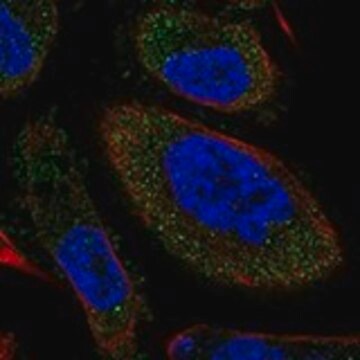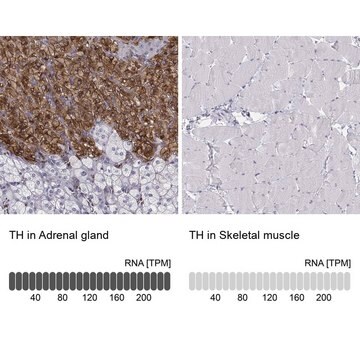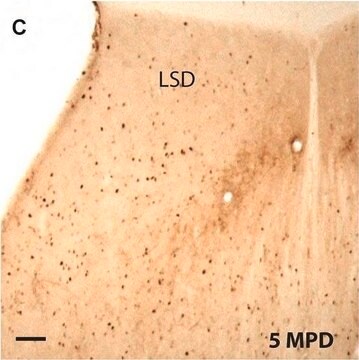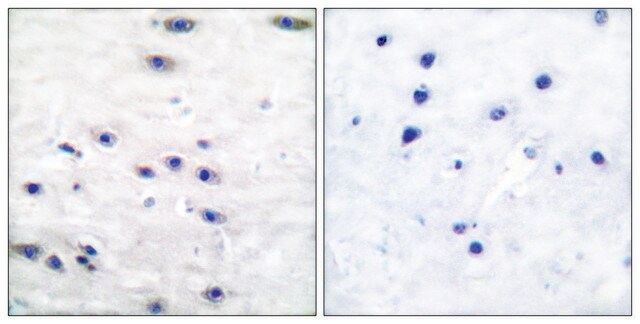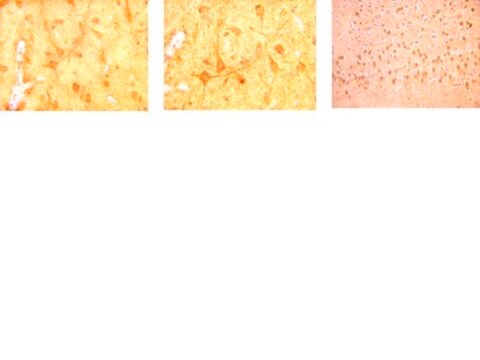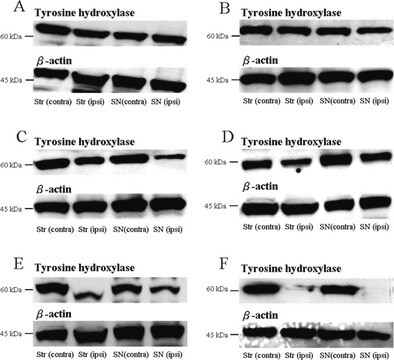추천 제품
생물학적 소스
rabbit
결합
unconjugated
항체 형태
affinity isolated antibody
항체 생산 유형
primary antibodies
클론
polyclonal
형태
buffered aqueous solution
분자량
antigen 58 kDa
종 반응성
human, mouse, rat
농도
~1 mg/mL
기술
ELISA: 1:40000
immunohistochemistry: 1:50-1:100
western blot: 1:500-1:1000
NCBI 수납 번호
UniProt 수납 번호
배송 상태
wet ice
저장 온도
−20°C
타겟 번역 후 변형
phosphorylation (pSer40)
유전자 정보
human ... TH(7054)
일반 설명
Tyrosine Hydroxylase (TH) is encoded by the gene mapped to human chromosome 11p15.5, close to the insulin (INS) and Harvey-ras-1 (HRAS) genes. The N-terminal end of the protein plays a vital role in maintaining intracellular stability of the enzyme. tyrosine hydroxylase is expressed in various tissues such as brain, adrenal medulla and sympathetically innervated tissues. The enzyme is characterized with a regulatory domain (R), a catalytic domain (C) at N-terminal end, and a coiled-coil domain at the C-terminal end.
면역원
The antiserum was produced against synthesized peptide derived from human Tyrosine Hydroxylase around the phosphorylation site of Ser40.
Immunogen Range: 41-90
Immunogen Range: 41-90
생화학적/생리학적 작용
Tyrosine Hydroxylase (TH) specifically catalyzes the hydroxylation of the amino acid L-tyrosine to 3, 4-dihydroxy-L-phenylalanine (L-DOPA). TH is a rate-limiting enzyme involved in the synthesis of catecholamine, involved in several brain functions, such as attention, memory, cognition, and emotion. Phosphorylation of the N-terminal portion of tyrosine hydroxylase controls the degradation of this enzyme by the ubiquitin-proteasome pathway. Alteration in the expression of the gene results in the pathogenesis of Parkinson′s disease (PD). Point mutation in the gene coding for TH leads to Segawa′s syndrome.
특징 및 장점
Evaluate our antibodies with complete peace of mind. If the antibody does not perform in your application, we will issue a full credit or replacement antibody. Learn more.
물리적 형태
Rabbit IgG in phosphate buffered saline (without Mg2+ and Ca2+), pH 7.4, 150mM NaCl, 0.02% sodium azide and 50% glycerol.
면책조항
Unless otherwise stated in our catalog or other company documentation accompanying the product(s), our products are intended for research use only and are not to be used for any other purpose, which includes but is not limited to, unauthorized commercial uses, in vitro diagnostic uses, ex vivo or in vivo therapeutic uses or any type of consumption or application to humans or animals.
적합한 제품을 찾을 수 없으신가요?
당사의 제품 선택기 도구.을(를) 시도해 보세요.
Storage Class Code
10 - Combustible liquids
WGK
WGK 1
Flash Point (°F)
Not applicable
Flash Point (°C)
Not applicable
시험 성적서(COA)
제품의 로트/배치 번호를 입력하여 시험 성적서(COA)을 검색하십시오. 로트 및 배치 번호는 제품 라벨에 있는 ‘로트’ 또는 ‘배치’라는 용어 뒤에서 찾을 수 있습니다.
K L O'Malley et al.
Nucleic acids research, 16(10), 4437-4446 (1988-05-25)
The gene for the catecholamine biosynthetic enzyme, tyrosine hydroxylase (TH), has been previously mapped to human chromosome 11 p15.5 in the vicinity of the loci for insulin (INS) and for the oncogene Harvey Ras 1 (HRAS). Here we show that
S Colette Daubner et al.
Archives of biochemistry and biophysics, 508(1), 1-12 (2010-12-24)
Tyrosine hydroxylase is the rate-limiting enzyme of catecholamine biosynthesis; it uses tetrahydrobiopterin and molecular oxygen to convert tyrosine to DOPA. Its amino terminal 150 amino acids comprise a domain whose structure is involved in regulating the enzyme's activity. Modes of
Christopher Tolleson et al.
CNS & neurological disorders drug targets, 11(4), 381-386 (2012-04-10)
Tyrosine hydroxylase (TH) is the rate limiting step in the biosynthesis of dopamine and other catecholamines. Differences have been noted in concentration and availability of this enzyme and its cofactors in disease states such as Parkinson's disease (PD) which are
Akira Nakashima et al.
Biochemical and biophysical research communications, 407(2), 343-347 (2011-03-12)
Tyrosine hydroxylase (TH) is the rate-limiting enzyme in catecholamine biosynthesis, and its N-terminus plays a critical role in the intracellular stability of the enzyme. In the present study, we investigated the mechanism by which the N-terminal region of TH affects
B Lüdecke et al.
Human genetics, 95(1), 123-125 (1995-01-01)
We have examined the molecular basis of Segawa's syndrome in six families with seven affected children. In one family two siblings with this disease carried a point mutation in exon 11 of the tyrosine hydroxylase gene, resulting in an amino
자사의 과학자팀은 생명 과학, 재료 과학, 화학 합성, 크로마토그래피, 분석 및 기타 많은 영역을 포함한 모든 과학 분야에 경험이 있습니다..
고객지원팀으로 연락바랍니다.